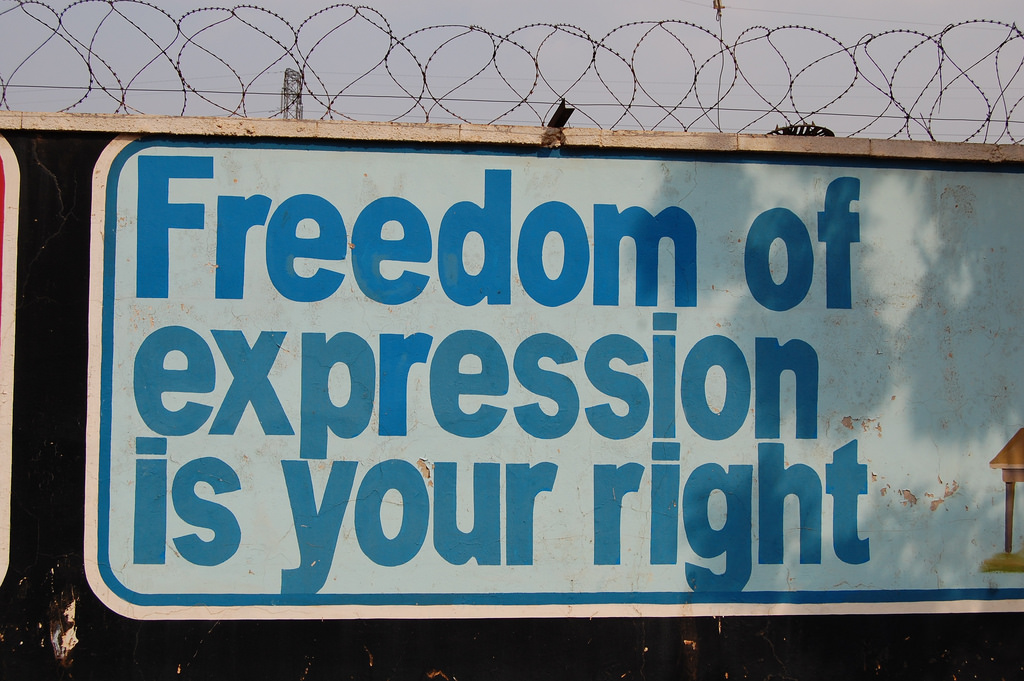The Special Rapporteur’s 2016 report to the General Assembly is now online.
Freedom of expression is in peril. Scores of journalists around the world are reported missing, detained, tortured or killed, and bloggers have been brutally murdered because their work angers religious dogmatists. Governments are establishing vague offenses against the glorification of extremism and terrorism, and penalties for defamation and sedition are more draconian than ever. Online censorship has become an everyday reality, and major telecommunications networks and Internet platforms have been turned into spying machines.
In this report, the Special Rapporteur examines critical contemporary challenges to freedom of expression, based on a survey of his communications to UN member States. Organized around the legal framework set forth by international human rights law, the report evaluates misuses and abuses of the grounds for legitimate limitations of freedom of expression. The outlook is grim: Whether online or offline, there is an all-too-common world view that imagines words as weapons. To reverse the tide, the Special Rapporteur urges States to take at least the following steps, in keeping with their obligations under human rights law:
(a) Review and, where necessary, revise national laws. National legislation increasingly adopts overly broad definitions of key terms, such as terrorism, national security, extremism and hate speech, that fail to limit the discretion of executive authorities. Legislation often limits the role of judicial or independent and public oversight. Proponents often give limited demonstration of how new legal rules are necessary to protect legitimate interests and proportionately address specific threats, and the legislative process often limits public engagement and debate. I would urge all States considering new legislation to ensure that their laws meet these requirements, and I encourage States to implement regular public oversight of laws that implicate freedom of expression to ensure that they meet the tests of legality, legitimacy and necessity. Where possible, States should not only adopt legal frameworks but also implement training, particularly among independent oversight bodies, of the principles of freedom of expression;
(b) Engage with special procedures of the Human Rights Council. As has been shown in the present report, while the response rate to communications is quite low, several States engage with the mandate holder in good faith. Engagement with communications and invitations to conduct country missions add significant value to the work of the mandate holder, since they allow us to seek an understanding of why States pursue certain policies (and, where those policies are adverse to freedom of expression, a possibility of encouraging officials to adopt other measures);
(c) Support or establish regional or subregional monitoring. Several regions have developed or are developing independent approaches to supporting freedom of expression. The Inter-American Commission on Human Rights, the African Commission on Human and People’s Rights and the Organization for Security and Cooperation in Europe have established monitoring mechanisms on the basis of norms that are consistent with the international and regional standards. Human rights courts serve as critical watchdogs in these regions, including subregional courts such as the East African Court of Justice and the Court of Justice of the Economic Community of West African States. At this time, however, no such monitors — expert- oriented or judicial — exist in the Middle East and North Africa or Asia. I strongly encourage States, in collaboration with United Nations and regional political bodies and civil society, to begin the process of developing independent monitoring mechanisms in those regions that do not currently enjoy them on the basis of international standards. I also strongly encourage civil society actors to make active use of the existing regional and global mechanisms, whether through supportive fact-finding and reporting or litigation, and to develop approaches to creating regional monitoring. The Special Rapporteur stands ready to support such efforts;
(d) Support independent media and civic space. In the face of State repression of reporting, it is critical that States make an extra effort to support independent voices in the media and civil society at large. At a minimum, I encourage States to avoid imposing restrictions on reporting and research that may be seen to criticize the Government and its policies or to share information about sensitive subjects, including terrorism. States should especially avoid imposing obstacles, such as accreditation procedures or penalties through defamation lawsuits or intermediary liability, that undermine independent media. At the same time, those with the means — such as private donors and foundations — should make a special effort to support independent media and to foster strong scrutiny of media conglomerations that squeeze out the less well-financed outlets;
(e) State leadership. One of the most disappointing aspects of the current situation for freedom of expression is that many States with strong histories of support for freedom of expression — in law and in their societies — have considered measures liable to abuse in their own countries or to misuse when applied elsewhere. In particular, Governments pursuing new policies to enhance surveillance or to limit Internet security should reconsider those efforts, as they often fail to meet the tests of necessity and proportionality. I strongly urge all States to consider that attacks on security on the Internet pose long-term threats not only to freedom of expression but also to national security and public order itself.
